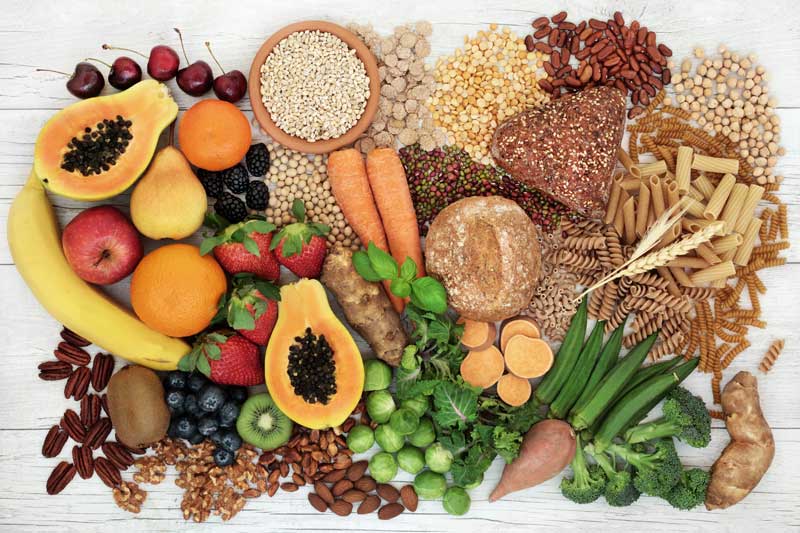What is the recommended carbohydrate intake for diabetes?
Are you totally confused by the information and have absolutely no idea how much you should be eating?
I don’t blame you because I’m a nutritionist and even I’m totally confused by what I read on these big diabetes sites. They certainly aren’t making eating easier for you!

So what is recommended?
Diabetes UK recommends 230 g for women, 300 g for men. This is “the advice provided by Diabetes UK for the general population with diabetes”.
Diabetes Australia has no specific carbohydrate amount but just recommends the same dietary guidelines for the general population, which is 6 serves a day for men and women.
American Diabetes Association suggests: “A place to start is at about 45-60 grams of carbohydrate at a meal.” This makes your daily carb intake over 3 meals anywhere between 135-180 g per day, which doesn’t include any room for snacks.
So going off these 3 large diabetes education sites we’re already totally confused!
- 230-300 g
- 6 serves
- 135-180 g
So we’re looking at a range between 135-300 g per day.
Geez…I really am confused {Scratches head…}!
Let’s get back to basic biochemistry, aka the way the body works.
How The Body Works
Quoted from Diabetes UK: “All the carbohydrates you eat and drink are broken down into glucose. The type, and amount, you consume can make a difference to your blood glucose levels and diabetes management”.
Did you get that?
- ALL carbs break down to glucose, ALL OF THEM!
- The type and amount make a difference to your blood glucose levels
That’s right, a carrot or some lettuce is not going to raise your blood glucose levels like potato and rice.
Quoted from Diabetes UK: “The amount of carbohydrate eaten or drunk is the major factor in blood glucose control”
Statement from the American Diabetes Association position statement 2013 (1): “Evidence exists that both the quantity and type of carbohydrate in a food influence blood glucose level, and total amount of carbohydrate eaten is the primary predictor of glycemic response”.
Okay, so wouldn’t it make sense to reduce carbohydrates if it’s the single biggest factor influencing blood glucose control? Or at least to limit the types of carbohydrates that produce the greatest effects?
To me it makes logical sense, but let’s keep exploring the issue.
Insulin
Let’s take a step back to biochemistry again…
Quoted from Diabetes Australia: “Insulin takes the glucose out of the blood and deposits it into the muscles, liver and other cells in the body where it is used to provide energy.”
Umm, yes that’s normally the case but diabetics are often insulin resistant, meaning insulin can’t remove the glucose out of the blood stream into cells.
Eating higher levels of carbs puts strain on the pancreas to produce more insulin to help drive the glucose into cells. When you cut down on carbs you have lower blood glucose so you stop putting additional strain on the pancreas, and you can work on tackling the insulin resistance issue.

Blood Glucose, A1C, and Cholesterol
Quoted from Diabetes UK: “Evidence exists suggesting that low-carbohydrate diets can lead to improvements in HbA1c and reductions in body weight”
Statement from the American Diabetes Association position statement 2013 (1): “Some published studies comparing lower levels of carbohydrate intake…indicated improved markers of glycemic control and insulin sensitivity with lower carbohydrate intakes”
And…”Some studies comparing lower levels of carbohydrate intake…revealed improvements in serum lipid/lipoprotein measures, including improved triglycerides, VLDL triglyceride, and VLDL cholesterol, total cholesterol, and HDL cholesterol levels”.
When the American Diabetes Association evaluate the evidence they show that there are clear benefits of following a lower carbohydrate diet, yet they also say the evidence is inconclusive and therefore conclude that: “Evidence is insufficient to support one specific amount of carbohydrate intake for all people with diabetes.”
While this is true to a certain extent because we are all individuals, and some individuals are more sensitive to others, it still remains that carbohydrates are the one singular thing that influences blood glucose response.
Sooo, doesn’t it make logical sense to decrease carbohydrates to gain better blood glucose control, improve a1c, and improve cholesterol?
Yes it does and that’s exactly what the evidence really shows.
Lower Carb Diets Reduce Weight and Blood Glucose…BUT…
Diabetes UK Nutritional Guidelines for Diabeteics 2013 (2) states: “Low-carbohydrate diets have created some controversy, but both a recent review and meta-analysis suggest that they are associated with significant reductions in body weight and improvements in glycaemic control”
But they also contradict themselves by saying: “Although the total amount of carbohydrate ingested is the primary determinant of post-prandial blood glucose response, there is little evidence to support specific strategies for recommendations about carbohydrate intake in Type 2 diabetes”.
Why is it that not one of these organizations will stand up and say, Yes the evidence is clear that lower carbohydrates diets help lower blood glucose levels, improve a1c, and improve cholesterol?
Why?
Is it because they are backed by the cereal and grain industry? Big food? Big pharma?
Sometimes I do wonder.
Lower Carb Diets DEFINITELY Show Better Outcomes
Perhaps the best research I’ve come across in a while is by a collection of 26 researchers from various universities across the world titled: “Dietary restriction as the first approach in diabetes management: Critical review and evidence base” (3).
It was exactly that, a critical review of the available evidence and was only recently released (2015), so in that sense it is the most recent evidence.
I am going to cover the entire paper in a series of podcasts (our new show coming soon) and hope to speak to some of the researchers too, but I’ll give you the title of the 12 points of evidence and I think you’ll get the point.
12 Ways A Lower Carb Diet Helps Type 2 Diabetes
- Hyperglycemia is the most salient feature of diabetes. Dietary carbohydrate restriction has the greatest effect on decreasing blood glucose levels
- During the epidemics of obesity and type 2 diabetes, caloric increases have been due almost entirely to increased carbohydrates
- Benefits of dietary carbohydrate restriction do not require weight loss
- Although weight loss is not required for benefit, no dietary intervention is better than carbohydrate restriction for weight loss
- Adherence to low-carbohydrate diets in people with type 2 diabetes is at least as good as adherence to any other dietary interventions and is frequently significantly better
- Replacement of carbohydrate with protein is generally beneficial
- Dietary total and saturated fat do not correlate with risk for cardiovascular disease
- Plasma saturated fatty acids are controlled by dietary carbohydrate more than by dietary lipids
- The best predictor of microvascular and, to a lesser extent, macrovascular complications in patients with type 2 diabetes, is glycemic control (HbA1c)
- Dietary carbohydrate restriction is the most effective method (other than starvation) of reducing serum TGs and increasing high-density lipoprotein
- Patients with type 2 diabetes on carbohydrate-restricted diets reduce and frequently eliminate medication. People with type 1 usually require lower insulin
- Intensive glucose lowering by dietary carbohydrate restriction has no side effects comparable to the effects of intensive pharmacologic treatment (3)
ALL of the evidence stacks up to show us that lowering carbohydrates in a diabetic diet provides so many valuable benefits that may help tackle our current epidemic that is growing out of control!
So is the recommended carbohydrate intake for diabetes wrong?
I’d say YES, if you go off those big diabetes websites it is WAY OFF target and is giving you information that is keeping you sick!
So is the recommended carbohydrate intake for diabetes wrong?
YES, and it is driving many dietitians to recommend amounts of carbohydrate that are keeping you sick and making it difficult for you to control blood glucose levels.
Is the recommended carbohydrate intake for diabetes wrong?
YES.
The recommendations of these organizations range from 135-300 g per day. This is TOO MUCH carbohydrate!
In that most recent study mentioned above (3) this is the definition of carbohydrates in the diet:
- Very low carb ketogenic diet: 20-50 g per day. Below 10% intake of 2000 calorie diet.
- Low carbohydrate diet: Below 130 g per day. Below 26% total energy intake. <<< Below this is what you need to aim for and 50-70 g/d is the goal
- Moderate carbohydrate diet: 26-45% total energy intake
- High carbohydrate diet: Above 45% total energy intake <<< Current recommendations that aren’t working
The current recommendations ARE NOT WORKING!!
Hello UK, America, and Australia, are you listening???
Here at Diabetes Meal Plans we recommend the optimal intake is between 50-80 g carbs per day. Read more about the research behind that here.
According to Diabetes UK, this is an acceptable level for diabetics. And according to low carb expert Mark Sisson, although lower carb levels can be beneficial there is often no need to compromise gaining valuable nutrients from vegetables by limiting intake to a very low carb diet.
For example: A carrot may contain more carbs than lettuce (carrots are often excluded in very low carb diets) but carrots also contains loads of micronutrients and fiber, so it’s not necessary to cut them out.
Lowering your carbohydrate intake is the fastest, easiest way to reduce blood glucose, improve a1c, improve cholesterol, and lose some weight too.
In the meantime, you might like to read this post on how to reduce carbohydrates in your diet. It gives you some great tips on where to get started.
Wishing you the best in health :)
P.S. Please share this post around!! This information MUST get out to more people because their life depends on it!
[accordion autoclose=”true” openfirst=”false” openall=”false” clicktoclose=”true”] [accordion-item id=”item-1″ title=”References+”]
References
1. Evert et al. Nutrition therapy recommendations for the management of adults with diabetes: Position statement. Diabetes Care. 2013;36:3821-3842.
2. Diabetes UK. 2011. Evidence-based nutrition guidelines for the prevention and management of diabetes. Download a copy here.
3. Feinman et al. Dietary carbohydrate restriction as the first approach in diabetes management: Critical review and evidence base. Nutrition. 2015;31:1-13.
[/accordion-item] [/accordion]

Linda Huso
Help. I love your site for my prediabetes diagnosis. However, my husband has heart disease
and recommended to be on a plant based diet. I am trying to find dinners that work for both of us. Any recommendations?
Thank you for considering.
Jedha: Nutritionist (MNutr)
It is not necessary for people with heart disease to eat a plant based diet. A healthy diet containg all nutrient dense foods is appropriate. Still, if his healthcare provider has recommended it, then you need to learn to adapt meals. This is relatively easy to do. You might consider joining as a VIP member, we have recommendations for vegetarian eaters as well, with options for every meal in the meal plans.
Megha
Pls send list of food for diabetes simply name of food
Emily - Dietitian (MS, RD)
Hi Megha, is this the type of food list you are looking for?
mark
Loved Article. I too have read the information out there and realized that it was wrong. If I consumed the recommended amounts of Carbs published by some sites I would be on Insulin. I am currently consuming around 50 to 60 carbs per day and getting readings of 130 to 150. If I did the amount of carbs allowed of 130 to 300 per day my readings would immediately skyrocket to 250 to somewhere well above 300. Thats insane
Emily - Dietitian (MS, RD)
Great work! Always make sure to look for the research before believing just anything you read!